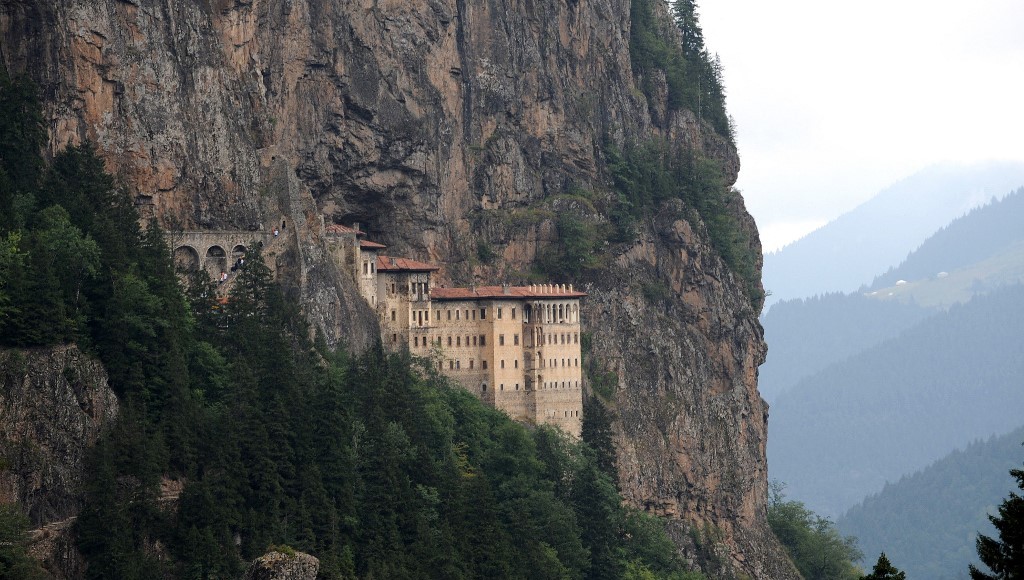Turkey’s nationalist opposition İYİ (Good) Party has urged authorities to cancel the Divine Liturgy scheduled by the İstanbul-based Ecumenical Patriarchate at the historic Sümela Monastery in Trabzon on Aug. 15, citing a violation of the 1923 Treaty of Lausanne.
Earlier on Friday, Ecumenical Patriarch Bartholomew, the spiritual leader of Eastern Orthodox Christians globally, voiced his frustration with Turkish authorities, stating that the patriarchate had not been granted written permission to conduct the Divine Liturgy.
Later that day, the patriarchate announced it had received written permission and would continue with its plan to hold the liturgy at Sümela Monastery in honor of the Orthodox feast of the Dormition of the Virgin Mary.
İYİ Party spokesman Kürşad Zorlu said his party had made a verbal request to the authorities to cancel the ritual.
After an 88-year hiatus, the service at Sümela Monastery was resumed in 2010 and has been held annually on Aug. 15 since then.
However, retired rear admiral Cihat Yaycı launched a campaign to prevent the ritual and sent letters to all political parties urging them to cancel it, asserting that it violated the Treaty of Lausanne.
Yaycı has been vocally active in alerting the Turkish public about international treaties that affirm the Turkish republic’s sovereignty over its territories. He was thrust into the spotlight during the height of maritime disputes with Greece and when 103 retired admirals expressed opposition to government plans to build a new canal in İstanbul to the west of the Bosporus due to concerns related to the Montreux Convention.
Doğan Bekin, a lawmaker from the Islamist New Welfare Party, an ally of the ruling Justice and Development Party (AKP), also opposed the ritual, saying “it would coincide with the 562nd anniversary of the conquest of Trabzon.”
İYİ Party spokesman Zorlu said on social media that Aug. 15 marks the date of Mehmet the Conqueror’s capture of Trabzon and added that “anti-Turkish groups view this day as a day of mourning.”
Last year, authorities designated Aug. 15 as the day commemorating Trabzon’s conquest by the Ottomans. Prior to that, the celebrations were held on Oct. 26.
Following its conquest by the Ottomans in 1461, Trabzon, which was once predominantly Christian and Greek, experienced a gradual change in its demographics.
During the Turkish War of Independence, Christian Pontic Greek communities in the province rose up against the Turkish army led by Mustafa Kemal, the country’s founding father. Following a forced population exchange with Greece as stipulated in the Treaty of Lausanne, the Christian presence in the city ceased, although many Greek-speaking Muslims continued to reside there.
Turkish nationalists oppose the liturgy by invoking the “principle of reciprocity,” a legal principle that involves mirroring legal effects in situations where foreign countries also recognize those effects. Articles 37 to 44 of the Lausanne Treaty mandate that Turkey respects the rights of minorities and ensures their freedom of religion.
However, Article 45 states that Greece should grant the same rights to the Muslim minority within its borders. Citing this article, nationalists argue that since Greece does not permit an Islamic ritual in the Fethiye Mosque in Athens, Turkey should, in reciprocity, disallow such rituals in areas where Christian Greeks are not present in significant numbers.
Turks who advocate for the performance of the liturgy argue that human rights are inalienable and that international treaties should not impede them.
In Turkey Christians, as a minority group, experience various challenges and rights violations, according to the 2022 Report on International Religious Freedom released by the US Department of State. The 1923 Lausanne Treaty formally recognizes the rights of Armenian Apostolic Orthodox Christians, Jews and Greek Orthodox Christians. However, Christian denominations still find themselves grappling with limitations on their religious rights.
A significant point of contention has been the Greek Orthodox Halki Seminary’s prolonged closure. The seminary, affiliated with the Greek Orthodox Church, was shuttered in 1971 after the Turkish Parliament enacted legislation banning private institutions of higher education. Despite multiple international critiques and assurances from the Turkish government, the seminary remains closed, hampering the Greek Orthodox Church’s ability to train clergy domestically.
Earlier, Ecumenical Patriarch Bartholomew had responded to the criticism of the violation of the Lausanne Treaty by reminding that their rights recognized in Lausanne were not being protected by the Turkish authorities.



